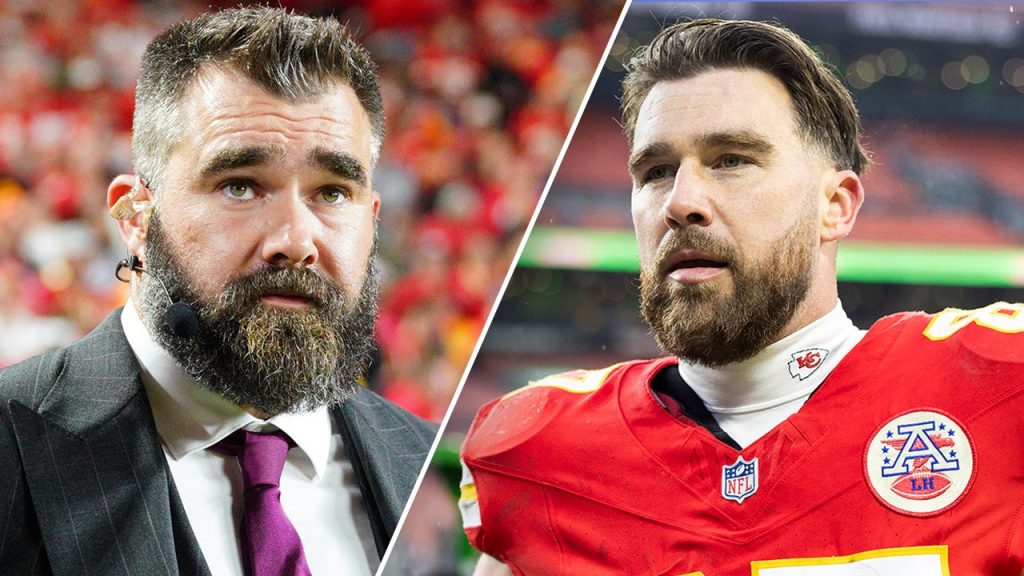The aftermath of the 2023 Ohio State-Michigan football game, marred by a post-game brawl, has led to the introduction of the O.H.I.O. Sportsmanship Act by Ohio state Rep. Josh Williams. This proposed legislation aims to specifically prohibit the planting of a flag on the Ohio State football field during a game, a direct response to Michigan’s celebratory flag planting following their victory. The act has sparked considerable controversy, particularly drawing criticism from NFL stars and brothers Travis and Jason Kelce, both of whom expressed their disapproval of the bill’s intent and implications.
The Kelce brothers, known for their outspoken personalities, voiced their concerns on their podcast, “New Heights.” Jason Kelce, the Philadelphia Eagles center, vehemently denounced the bill, labeling it “petty” and questioning the authority of a state representative to legislate on matters concerning on-field conduct in a college football game. He argued that such issues fall under the jurisdiction of the NCAA, not state lawmakers. Furthermore, he expressed concern over the potential criminalization of such acts, questioning whether players would face arrest for planting a flag. Travis Kelce, the Kansas City Chiefs tight end, while acknowledging the importance of sportsmanship, also criticized the bill, suggesting it was an overreaction and a sign of weakness, contrasting the perceived “toughness” associated with Ohio State football with the perceived “softness” of the proposed legislation.
The heart of the Kelces’ argument rests on their belief that the bill represents an overreach of legislative power and a misunderstanding of the dynamics of rivalry games. They contend that while the post-game fight was unacceptable, the act of planting a flag, though provocative, is part of the tradition and intensity of such rivalries. Jason Kelce argued that such “dumb things,” while sometimes excessive, contribute to the unique atmosphere of these games. He expressed concern that sanitizing the rivalry by outlawing symbolic acts like flag planting could diminish the passion and excitement that define college football.
Williams, in defense of the bill, cited the need to curb behaviors that incite violence and endanger law enforcement officers, referencing the use of pepper spray by police during the brawl. His social media posts emphasized the importance of sportsmanship and condemned actions that escalate tensions and lead to physical altercations. He framed the bill as a measure to ensure player safety and promote respectful conduct within the context of intense competition. The differing perspectives highlight the ongoing debate regarding the balance between maintaining the spirit of rivalry and ensuring player safety and appropriate conduct.
The incident that precipitated the proposed legislation involved a post-game melee between players from both teams, resulting in the deployment of pepper spray by law enforcement officials. This altercation underscored the already heated nature of the Ohio State-Michigan rivalry, a rivalry steeped in tradition and heightened emotions. The Big Ten Conference, in response to the brawl, imposed fines of $100,000 on both universities for violating its sportsmanship policy, acknowledging the need to address the escalating tensions and promote more respectful behavior on the field.
The O.H.I.O. Sportsmanship Act, while seemingly targeting a specific act, symbolizes a broader discussion on the acceptable limits of rivalry expression. The Kelces’ criticisms, while focusing on the bill itself, reflect a deeper concern about the potential for overregulation and the sanitization of the passionate aspects of college football rivalries. The debate highlights the challenge of maintaining the intensity and tradition of these games while ensuring player safety and promoting respectful conduct. The proposed legislation adds another layer to the ongoing conversation about the appropriate balance between competition, sportsmanship, and the expression of rivalry. The long-term impact of the bill, and its potential implications for other rivalry games, remains to be seen.

